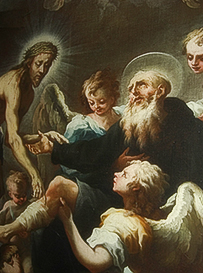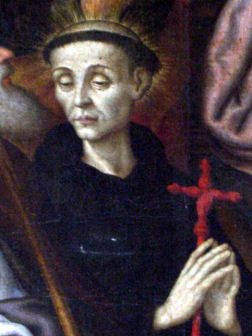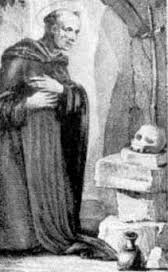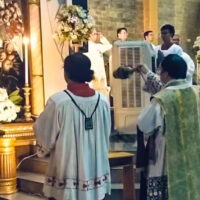 Clelia Barbieri was born on 13 February 1847, at Le Budrie in the Diocese of Bologna, Italy. Her early years were passed in the great poverty.
Clelia Barbieri was born on 13 February 1847, at Le Budrie in the Diocese of Bologna, Italy. Her early years were passed in the great poverty.
In 1868, together with three companions, she founded a community to care for abandoned girls and to provide for their education. She died at the age of twenty-three on 13 july 1870, at Le Budrie where her body is venerated. She was canonize by Pope John Paul II on April 9, 1989. From the small group at Le Budrie was born the religious family of the Minims of the Sorrowful Virgin.
God has chosen the weak o/ the world Clelia was born in the town of Le Budrie, in the Diocese of Bologna, on 13 February 1847, of very religious parents, Giuseppe Barbieri and Giacinta Nanetti. Her fellow villagers and neighbors eked out a meager living by the work of their hands, but, because of the lack of resources, were often ill. When Clelia was eight her father died of cholera.
The young girl learned from her mother not only how to sew and weave wool, but, more importantly, how to love God and live a religious life. She often asked her mother: “Tell me about God,” or “What can I do to become holy? ” She regularly went to church, and spent time at prayer. She earnestly applied herself to the study of the catechism. By nature she was gentle and sweet, and remarkably innocent. When she wove hemp for marketing, she used to say to her mother who was urging her on to greater speed: “Mother, we’re being paid for this work, so we have to do it as well as we can.”
She developed her soul and mind by spiritual reading, especially the work of Saint Alphonsus Liguori entitled Practica di amare Gesù Cristo, and the Filotea of Giuseppe Riva. She availed herself of the competent spiritual guidance of Don Gaetano Guidi, pastor of the town of Le Budrie, and with his help made great strides forward in love of God and Christian perfection.
Urged on by this man of God and her own natural inclinations, she wanted to dedicate herself entirely to the service and well-being of her fellow human beings. With this in mind she and other young people of the town began to work zealously at helping the poor and instructing the young in Christian doctrine. After Vespers on Sundays she and her three companions met regularly and they would speak together about God. Gradually they decided upon sharing a common life. “We’re so poor,” Clelia used to say, “that we won’t be accepted into any institute. So we’ll join together in a common life, dedicating ourselves entirely to God and neighbor.”
As a result, on 1 May 1864, the four young girls, trusting in God alone, moved into a small house, 10cally known as “The Master’s House.” There they established a quiet place withdrawn from the world, called “The Retreat of Le Budrie,” which is rightly considered the cradle of the Congregation of the Minims of the Sorrowful Virgin. At first the primary concern of the members was to care for girls deserted or neglected by their parents, and train them in good living and domestic work.
A little later, during a retreat, Clelia wrote a rule of common life, which stressed prayer, sacrifice, work and love. The group of sisters chose as their patrons the Sorrowful Virgin Mary, whose devotion the Friar Servants of Mary had fostered in the Diocese of Bologna, and Saint Francis of Paola, the most humble of the servants of God whose help they sought in the necessities of life.
Gaetano Guidi, the pastor, appointed Clelia superior of the group, for God had enriched her with heavenly gifts. This is shown by the only handwritten letter of hers which we have, a letter entitled “Jesus, my beloved Spouse.”
Meanwhile, while Clelia progressed rapidly through the stages of sanctity, the first stages of tuberculosis appeared in her fragile body. For seven months she was confined to bed. Finally, on 13 July 1870, after saying: “Be of good cheer! I’m going to Paradise, but 1’11 always be with you, and never desert you,” she went to the Lord.
On the first anniversary of her death, as if in fulfillment of her promise, while her companions were gathered in prayer in what had been her bedroom, a voice-which all present thought to be that of Clelia -was heard responding to the prayers of the sisters. From this modest beginning, the Congregation of the Minims of the Sorrowful Virgin grew. Clelia was beatified by Pope Paul VI on 27 October 1968. Her body is venerated in the chapel of the Congregation’s motherhouse at Le Budrie.
Prayer
Father, in Clelia Barbieri you gave the Christian community an example of Gospel life celebrated in the service of others. Grant that, like her, we may do the work of the Lord, as servants of his kingdom. We ask through our Lord Jesus Christ.
 Diocese of Parañaque
Diocese of Parañaque












